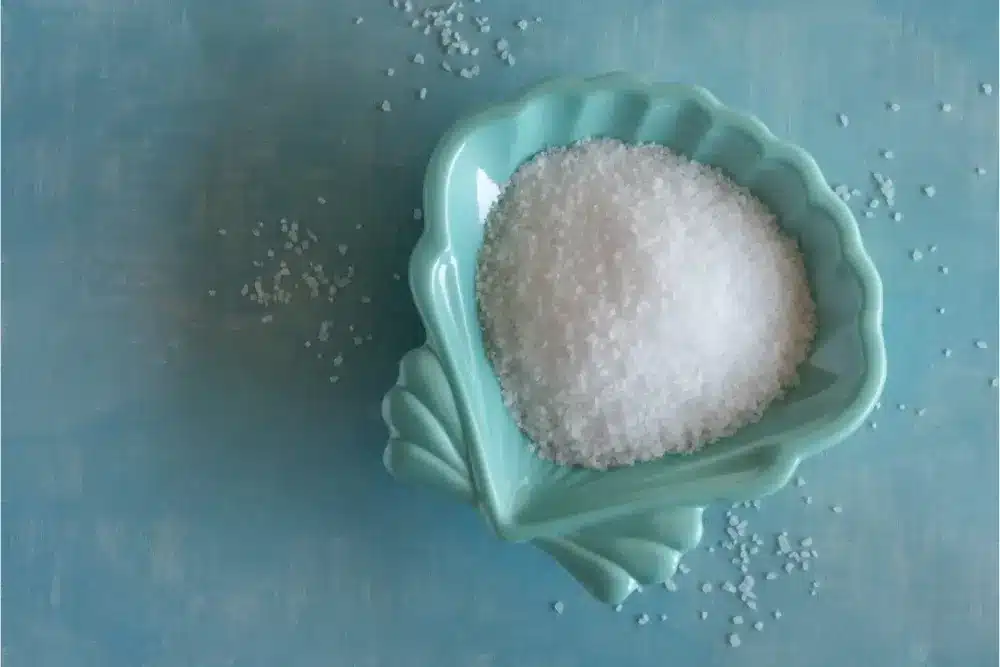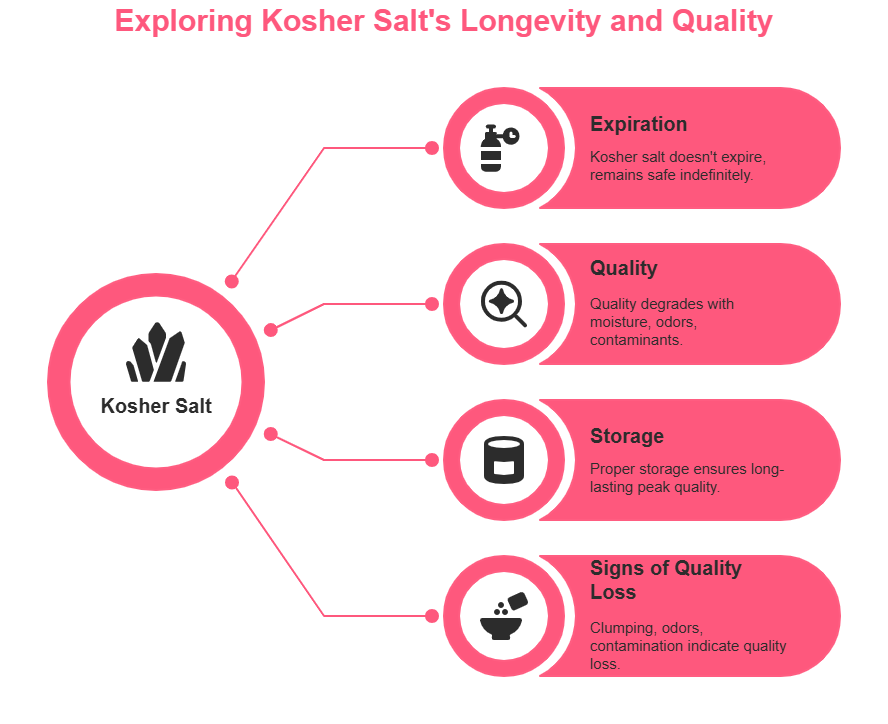Does Kosher Salt Expire? Shelf Life, Storage Tips & Freshness Guide
- Zayan Rauf

If you’re wondering, does kosher salt expire? you’re in the right place. This guide will answer that question clearly and simply. We’ll also cover how long does kosher salt last, does kosher salt go bad, and its overall kosher salt shelf life. You’ll learn how to tell if your salt has lost quality, how to store it, and when it’s best to replace it. Let’s dive in.
Table of Contents
What Is Kosher Salt and Why It Lasts
Kosher salt is a coarse-grained salt preferred by chefs and home cooks for its natural flavor and easy handling. Unlike table salt, it usually has no additives like iodine or anti-caking agents. Because it is pure sodium chloride, kosher salt has an extremely long shelf life and effectively has no expiration if kept in dry conditions.
Does Kosher Salt Expire or Go Bad?

The short answer is no, kosher salt does not expire. It is a mineral, not food that spoils. However, it can lose its quality over time, especially if exposed to moisture, strong odors, or contaminants. In that case, the salt may clump or develop off-smells, which affects its usability but not its safety.
You Can Also Read These Guide:
How Long Does Kosher Salt Last?
If stored properly, kosher salt can maintain peak quality for up to five years, though it can remain usable well beyond that. However, manufacturers often include a best-by date of around five years, which refers to optimal texture and flavor, not safety.
Signs That Your Kosher Salt Has Lost Quality
Here’s how to spot problems:
- Clumping – Big lumps indicate moisture exposure. You can break them apart before using.
- Odor absorption – Salt can pick up smells from nearby spices or foods. If it smells off, replace it.
- Visual contamination – Bugs, dust, or discoloration suggest issues discard if you see these.
As long as the salt is dry, odor-free, and clean, it is safe to use even after the best-by date
Best Practices to Prolong Shelf Life
To ensure your kosher salt lasts for years:
- Store in an airtight container to block moisture and odors
- Keep in a cool, dry place away from stoves, sinks, and humidity
- Use clean, dry utensils to scoop salt to prevent contamination
- Avoid mixing antidotes like wet spoons or ingredients into salt
These simple steps can help maintain ideal texture and flavor for years
Read More: The Ultimate Guide to Himalayan Salt Detox
Does Kosher Salt Go Bad in the Same Way as Table Salt?
Table salt often has additives like iodine and anti-caking agents, which can affect how long it stays fresh. Because kosher salt lacks these additives, it does not degrade in the same way. Other salts like sea salt or Himalayan salt also resist spoilage if kept dry.
Storing Different Types of Salt
- Kosher salt lasts indefinitely when stored correctly
- Sea salt and Himalayan salt also last forever but may clump if they contain moisture
- Iodized table salt generally has a best-by date of five years due to the stability of additives
Sobaan Salts, Trusted Himalayan Salt Manufacturer and Exporter, provides high-quality kosher salt that lasts longer when stored correctly.
Practical Tips for Families and Cooks
Kosher Salt vs Other Salts How They Compare
Salt Type | Additives | Expiration | Quality Over Time |
Kosher salt | None | No | Lasts indefinitely |
Sea salt/Himalayan salt | Possibly none | No | May clump if moist |
Table salt (iodized) | Iodine, anti-caking | ~5 years | Additive strength may fade |
Final Answer: Does Kosher Salt Expire?
No. Properly stored kosher salt remains safe and usable indefinitely. You can trust it for years of kitchen use, even beyond best-by dates. Monitor for clumps, smells, or visible contamination. Replace only if any of these issues arise, and you’ll always have flavorful, reliable salt on hand.
Takeaway Summary
- Does kosher salt expire? No.
- How long does kosher salt last? Indefinitely, but best quality up to five years.
- Does kosher salt go bad? Not food-safe, but moisture and odors can affect quality.
- Kosher salt shelf life depends entirely on storage.
Mindful storage and occasional quality checks are all you need for a long-lasting supply of kosher salt.
The global kosher salt market was valued at approximately USD 1.20 billion in 2024 and is forecast to grow at a compound annual growth rate of around 5.8% through 2034. (Source: Kosher Salt Market Report and Forecast 2025-2034)
Share This Post
Article By

